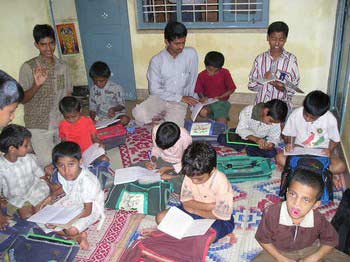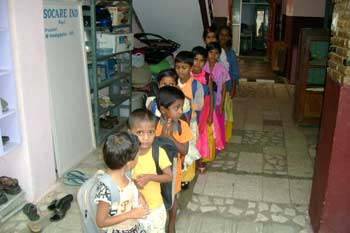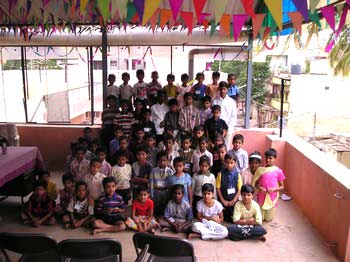 | « Back to article | Print this article |
He put his life's savings for a home for prisoner's children
'The children of life convicts are rendered orphans for all practical purposes, and to see them crying outside the jail is very sad,' V Mani, who started a home for them after his retirement, told Vicky Nanjappa.
Continuing our Independence Day special series: Extraordinary Indians.
There are very few people in India who can touch several lives and one such person is V Mani.
While working as an assistant general manager at the Reserve Bank of India, Mani passed the central jail in Bengaluru every day. The sight of relatives, particularly children, waiting outside the jail to see their loved ones made him decide that he needed to do something for the children of prisoners.
"The children of life convicts are rendered orphans for all practical purposes, so I decided why not do something for them and hence Socare Ind (Society's care for Indegent) was born," says Mani, who started Socare in 1999, along with his wife Saroji, after his retirement. The couple put their retirement money and all their life's earnings to the cause.
"To see children crying outside the jail moved me a great deal and the thought that the breadwinner of the family was inside made me even more sad. These kids were being treated as burdens in society."
Today, Socare has 136 children under its care and Mani says the main focus is on basic education to the deprived and providing comprehensive care to the children of prisoners in Karnataka. The children are also provided with vocational training after the 10th standard and higher education.
There is a feeling of joy as one enters Socare in Rajajinagar Bangalore. Children all set to go to school are saying their prayers. As I enter Mani's office, I am greeted with a smile. A couple of kids follow me inside and start troubling their uncle (Mani).
What is even more touching is that Mani, who was discharged from hospital after a cardiac problem just four days ago, becomes almost a child with the children, often fighting and laughing with them.
'Each child is sent to the best schools'
They are sent in separate batches to school, before leaving, they once again line up before the main gate to say their prayers. Once back in the evening, it is time for another class.
After a brief chat with uncle Mani and telling him how their day was, they have tea and then it is study time. They have to complete their home work compulsorily before recreation, during which, they either watch television or play with the other inmates.
"I only want the best for these children and I have ensured that each one is sent to the best of schools in Malleshwaram," says Mani. Malleshwaram is one of the best localities in Bangalore. "Isn't it nice to see these children mingling with the cream of Bangalore? God was so true when he said all are equal."
The children at Socare need special care. Most of their parents are dreaded killers. Prakash, a four-year-old boy's mother killed his father while this baby watched helplessly.
"We have ensured that he is well brought up and gets nothing but the best. Why should society make this innocent boy pay for the sins of his parent?" asks Mani.
"We take care to ensure that the kid's mind is not scarred and he can be like any other normal person."
Prakash's mother killed his father while he watched helplessly
The case of Shweta (name changed) too is similar. She came here at the age of 10 and has been here since the past three years. Her mother is in jail for murder, but she prefers not being reminded of it.
"I have been given a great opportunity by God who sent me to Mani uncle. I am given the best education. What more can I ask for? Over here, I feel at home and I would not like to go back to my mother. This is my family now. I am happy here and don't feel any different since we all share a common problem," she says.
"Even at school the rest of the children have been nice to me and not once has my background come up. I want to study further and become something. My only request is nobody should remind me of my past since in no way is it my fault," she continues.
Mani adds that utmost care is taken and the school authorities are requested to ensure that these children feel like any other child. "A scar on this child's mind could be fatal for the growth and future."
Parents never come back to pick up their children
"They have come and met them while on parole or after their release. But do you understand what it means to spend 14 years in jail? The parents who have been released have spoken to me and I personally feel that it is not safe to send the children back to them immediately. After coming out of jail, they face a terrible social stigma and are not prepared to take care of their children."
"On several occasions, they say that their child will be best taken care of under me. We never insist too hard as we know for a fact that forcing the child upon parents who are unable to take care of them is the worst possible thing to do."
Socare is just 10 years old and Mani says the future of these children is secure.
"I am ready to provide them with whatever education they need. Once the first batch of kids finish school and college, we shall sit together and find out where their interests lie. If they want to become doctors or engineers, we will take care of it. Our goal ends when the child can fend for herself/himself."
Currently Socare Ind runs two free home units separately for boys and girls. The children come from outside jails across Karnataka. Apart from educating the children, Socare also conducts extra curricular activities like singing, dancing and computer classes. The kids are taken on excursions during holidays.
Despite having cardiac surgery 4 days ago, he still comes to be with the kids
"Today we are a recognised unit," he says. "The courts too in their judgments suggest that the child of a convict be sent to Socare so that he or she is cared for. There is a lot of adulation and recognition. But none of this compares to the fact that we take care of children who are really in need."
Mani does a lot of administrative at Socare. There are a few caretakers, a manager and several other persons to help run Socare. There also six teachers who help the kids in the evening with their revision and home work.
Despite being ordered rest by the doctor following the cardiac surgery, Mani still finds time to come to his office and spends a lot of time with the children.
As I speak with him, he gets a call from his son who is settled abroad, asking him to rest. He replied, "Please let me do my work. Don't go on insisting that I rest, it only stresses me out to hear that."
Mani lost his wife, who was the co-founder of the organisation, four months ago. There is a sadness in his eyes, but there is also hope that he is living his dream of making a difference to the lives of many a convict's children.
For more information on V Mani's work, log on to http://www.socare.org/beta/
Do you know Extraordinary Indians like Mani? Please send us their name, contact information and a description of their work at extraordinarylives@rediffmail.com



